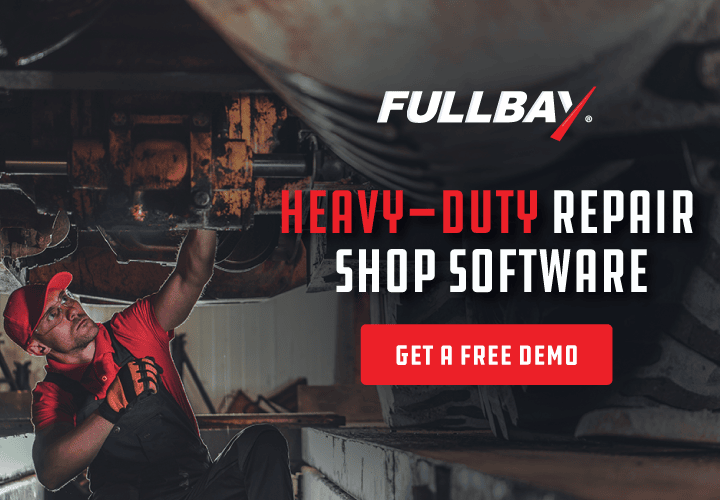3 Red-Hot Takeaways From The Last Shop Owner Roundtable Of 2023

Hey there, Fullbay friends and family! If you woke up this morning thinking, “Gosh, I wish Fullbay would talk to some fire folks and tell us about it…” Well, by golly, this is your lucky day.
Are you ready? Are you ready for this awesomeness?
We’re talking to fire truck people.
That’s right. Patrick and Chris sat down with Craig Probst, President of Henrickson Enterprises (including Hendrickson Fire Rescue Equipment), and Kevin Crump, the company’s COO. They sell and service fire and rescue vehicles, and also sell emergency equipment for the same.
The webinar itself is a wonderful listen, and both Craig and Kevin were kind enough to stay a little longer to answer extra audience questions. You should definitely listen to and watch both, but we’ve got some fiery takeaways for those of you who are in a rush (and don’t mind fire puns).
As a side note, we picked these takeaways based on the conversations we’ve been having and seeing around the industry—these are topics that are ultra-important in the fire field, but will also ring true for diesel repair shop owners in general.
1. HOW THEY HIRE PEOPLE
Yes, fire trucks and engines are super-cool pieces of equipment. But Hendrickson also reports trouble hiring talented technicians from a shrinking pool.
Fortunately, the very nature of the field gives them an edge. Fire trucks are complex pieces of equipment, and yes, they have that life-saving glamour about them. (It helps that they are also very, very shiny.) The folks at Hendrickson Fire Rescue Equipment have done their best to create a beautiful facility with lots of lightning and polished floors—no dark, dingy environment here.
In addition, because they’re a Cummins dealer, techs that work for them end up with Cummins certifications, along with other knowledge. That’s very attractive to anyone looking to “up” their value over time.
Don’t know a fire apparatus from a big rig? That’s okay. “We’ll teach you the lingo,” Craig says, pointing out that there’s a lot of overlap between the regular diesel field and emergency vehicles.
2. HOW TO BREAK INTO THE FIRE FIELD
Isn’t it weird that there isn’t an easier way to say “break into the fire field”? Maybe, “Get involved with emergency services”? But that sounds like you’re becoming a firefighter or EMT. We’ll work on that over our holiday break.
Anyway. If you’re an independent shop interested in working with a fire department, Craig suggests networking. “A lot of fire dealers have very large territories, and they might cover multiple states and only have a few locations and mobile techs.” This leaves them with a problem—they need independent shops to step up and fill in the gaps when those vehicles need repairs. “Develop a relationship with a fire truck dealer that might be looking for some [service assistance] in an area where they might not have good coverage,” he advises.
Kevin agrees, and points out, “A really good sales guy sells the first truck—the service department sells the rest … If you can’t service what you sell, you’re probably not gonna get repeat sales.”
3) WHY QC CHECKS ARE NOT FOR THE FAINT OF HEART
Kevin used to be involved in manufacturing fire trucks, and tells a story about the firefighters who worked with him: “They’d say, ‘We’re the ones running into the building when everyone else is running out.’”
They were right. And that sentiment has rightfully stuck with him. If something goes wrong with a fire truck or engine, you aren’t just looking at a vehicle that fails to start, or sounds bad—you’re essentially taking a huge, lifesaving piece of equipment out of commission. If something goes wrong during a fire and a second check could have prevented it, well…
Needless to say, Hendrickson’s techs do a lot of QC checks. The training of new techs is rigorous and always involves the oversight of a more senior (or “A”) technician. Fire apparatuses in particular tend to have a lot of stuff on them—there’s often a measure of disassembly involved to get to a part that needs repair or replacing. Once the repair is complete, the tech has to re-assemble everything, taking care not to introduce new problems.
It’s a lot of work. It’s worth it, but a lot of work.
(As an aside—Kevin provides an outstanding overview of their training—it’s worth a listen for anyone!)
AND A LOT MORE
One of the reasons we love the diesel industry is the people in it are just so dang generous with their time and knowledge. Craig and Kevin are no exception; the amount of information they drop is phenomenal. Besides the above, they also touch on:
- How they manage their labor rates during inflation
- How they put data mining to work for them (and what they mean by data mining 😉
- How they deal with insurance when it comes to their extremely intricate and valuable equipment
- How they keep their shop clean (and how texting [seriously] helped!)
- …and more
For real, we hope you sit down and give this webinar the listen it deserves. And while you’re at it, don’t forget to listen to the extra Q&A session that went on after the allotted time ran out!
We’re so glad Craig and Kevin stopped by to help us learn more about the world of emergency repair. And if you’re hungry for more Shop Owner Roundtables, well, have no fear: more are on the way! We’ve already got some awesome episodes up for season two. Go watch!

